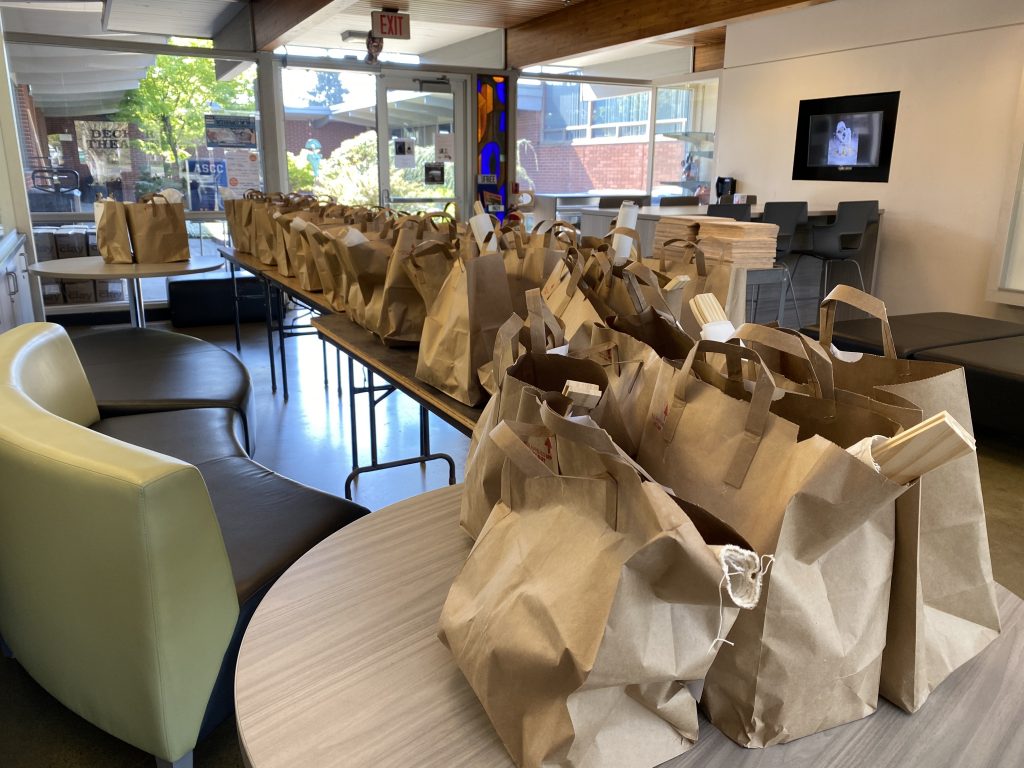With just a few weeks notice, Clark College faculty move their teaching online

When Gov. Jay Inslee announced his Stay Home, Stay Healthy order in response to the COVID-19 outbreak, Clark College professors had less than a month to adapt about 2,000 classes’ curriculum to be taught online. Now, as spring term is more than halfway over—and the ongoing pandemic has led to most summer and fall classes being offered remotely as well–it’s clear that they were more than up for the challenge.
“Our faculty are resilient and dedicated to student success,” said Vice President of Instruction Sachi Horback. “Though there were many reasons to settle for being ‘good enough,’ amidst this pandemic, our faculty pushed ahead, ensuring that our students had equitable opportunities for student learning. As educators, we were made for this, readily adaptable and willing to do whatever is needed in service to our community.”

“Our motto is ‘we make it work,’” said Baking Professor Alison Dolder of her department’s faculty. “All of us jumped right in to record baking videos, to learn Zoom and Canvas. We are not technology-savvy people. But we are dedicated.”
Faculty and staff worked to create take-home boxes of baking supplies for each student to use, filled with the ingredients and tools of their trade—rolling pins, measuring spoons, etc. They also worked to learn how to produce useful instructional videos, no small feat: It requires a certain amount of choreography to capture the best camera angle for a stand mixer.
“Hands-on,” but online
Indeed, it was a challenge experienced across the college: How does an institution that prides itself on its “hands-on learning” adapt to a virtual educational experience? But over and over, faculty stepped up.
In professional technical and allied health fields, faculty quickly re-organized curriculum so that students’ lecture classes took place during spring term and lab classes could be delayed until summer, providing additional time to set up safe social-distancing protocols for in-person lab work.
Mathematics professors collaborated with the college’s Tutoring Services to place tutors right in Zoom classrooms so that students got the one-on-one help they needed to understand material. Tutors also worked to create a Zoom version of their regular English practice chats held for English as a Second Language students. Art professors arranged virtual tours of galleries and museums for their students.
Ceramics professor Lisa Conway drafted her husband, a professional video editor, into helping her create a series of instructional videos for her students. As with baking students, Conway’s classes received boxes of supplies and equipment to complete class projects at home.
“For the month before spring classes started, I was working hard and was busier than I’ve ever been in my 30 years of teaching college,” Conway said. “We’re all making videos. We’re all dealing with how students get their supplies and materials. We’re all completely changing how we function in this universe. We’re all reinventing our classes from scratch.”
Learning from each other

Professors have been sharing best practices and tips with one another as they develop their skills to deliver education online.
Computer Technology Professor Bruce Elgort has become something of a go-to source for many of his colleagues during this shift. Elgort, a two-time Exceptional Faculty Award winner, has a long professional history in the tech field and already used many online tools, including Slack and videos, in his teaching.
This spring, Elgort taught his classes using the synchronous modality, which means the classes meet the same time online as they would in the classroom. (“Asynchronous” refers to online classes that have no set time.)
“The most difficult part of going online is learning new software and learning to shoot video,” said Elgort, who has provided tips and tricks to faculty on this subject and others.
Faculty also have had a great resource in the college’s eLearning department, which oversees the college’s many online learning offerings. Even before COVID-19, more than a third of Clark College students were taking at least one class with online components.
In fact, several programs are taught entirely online in Business Administration, Network Technology, and Psychology. They provide students the flexibility they need in balancing college, work and family. More eLearning programs come online each year.
“Offering our business programs entirely online will allow our students to successfully complete their desired degrees regardless where they live,” says Business Administration Professor Adnan Hamideh. “It will also attract working people who did not think about going to school because their work hours conflict with a school schedule.”
A More Flexible Future
Clark College has already announced that summer and fall classes will be offered primarily online, with some in-person labs conducted in career technical classes that require hands-on learning, using social distancing and safety precautions. But even when it becomes safe to congregate in large groups again, the current move to remote education may leave lasting changes on higher education.
“Moving past COVID-19, I think more programs will go online as professors and students gain confidence,” said Bruce Elgort. “Professors and students enjoy personal interactions with one another. Most would not have chosen this sudden shift to remote learning. But through the process, many have acquired a taste for eLearning. It is a powerful tool. In the future, professors will have opportunities to blend different teaching modalities to include face-to-face and online instruction.”
“No one really know what will happen in this next six months and how it impacts what we do at Clark College,” said Alison Dolder. “This experience has taught us that we are highly adaptable and that we can learn new technology. With each adjustment, we decide how to move forward—with our students’ success in mind.”
Learn more: Watch this YouTube video for more stories about Clark College art faculty adapting to remote teaching.












